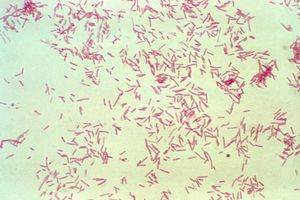Bacteroides fragilis
Classification
Kingdom: Bacteria
Phylum: Bacteroidetes
Class: Bacteroidia
Order: Bacteroidales
Family: Bacteroidaceae
Genus: Bacteroides
Species: Bacteroides fragilis
Introduction
Bacteroides fragilis (BF) is a Gram-negative bacterium found in the human colon [1]. Although it is relatively rare compared to other species of Bacteroides, it is the most common clinical isolate [2]. BF is responsible for a large number of opportunistic infections in hospitals and contributes significantly to morbidity and mortality [2]. In addition to opportunistic infections, BF has been known to cause complications such as colorectal cancer and cholitis. [3] This bacterium is of interest to researchers because of its ability to evade immune responses and evolving drug resistance.

Genetics
Include some current research, with at least one image.
Section 2 Microbiome
Include some current research, with a second image.
Conclusion
Overall text length should be at least 1,000 words (before counting references), with at least 2 images. Include at least 5 references under Reference section.
References
- ↑ Kuwahara, et al. "Genomic analysis of Bacteroides fragilis reveals extensive DNA inversions regulating cell surface adaptation." Proceedings of the National Academy of Sciences 101.41 (2004): 14919-14924.
- ↑ Salyers, A. A. (1984) Annu. Rev. Microbiol. 38, 293-313.
- ↑ Carolyn Redondo, Maria, et al. "Attributable mortality of bacteremia associated with the Bacteroides fragilis group." Clinical infectious diseases 20.6 (1995): 1492-1496.
- ↑ Sears, Cynthia L. "Enterotoxigenic Bacteroides fragilis: a rogue among symbiotes." Clinical microbiology reviews 22.2 (2009): 349-369.
Edited by James Cawthon, student of Joan Slonczewski for BIOL 116 Information in Living Systems, 2019, Kenyon College.
